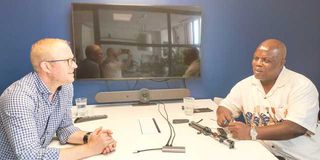
Thomas Capdevielle, the Head of Testing and Compliance at the Athletics Integrity Unit (AIU), during an interview with the Daily Nation at the AIU headquarters in Monaco on June 12, 2023.
| Elias Makori | Nation Media GroupAthletics
Premium
AIU: Kenya must not relent in the war against doping
Nation Media Group’s Lead Editor (Sports and Integration Projects) Elias Makori recently spent a morning at the Athletics Integrity Unit’s (AIU) Monaco headquarters with the anti-doping watchdog’s Head of Compliance and Testing Thomas Capdevielle to dissect Kenya’s status:
Q: Thanks, Thomas, for making time for the Nation Media Group. Perhaps you can start by giving a short introduction about what the Athletics Integrity Unit is and what you do?
A: The AIU is an independent structure put in place by World Athletics to tackle all sorts of fraud in the sport of athletics. It’s a bit like the police of athletics.
Anti-doping is our main activity but it’s not only that. We also cover age manipulation, competition manipulation, fraud, corruption, betting in sport… it’s a really full remit that we have.
And we are addressing these through different pillars: We have Education and Prevention - because the first thing we want is that fraud doesn’t happen and so it’s a very important aspect of our work to make sure that the athletes are properly educated and understand the dangers and consequences of their actions.
The other pillar is Testing. We have a very strong testing programme which we implement globally with 90 nationalities in our registered testing pool… we test athletes every day, everywhere in the world, and we have the team here to prepare the tests and make sure the tests are very well planned.

Thomas Capdevielle, the Head of Testing and Compliance at the Athletics Integrity Unit (AIU), with Nation Sport’s Elias Makori (right) at the AIU headquarters in Monaco on June 12, 2023.
Then we have an Intelligence and Investigations team that helps support the testing team and Case Management Team, which is the legal team.
On top of these we have communication functions which is important because transparency is very important for the AIU. It is part of our credibility that we are judged on what we do but also on the ability to share this for transparency, so that people are not caught by surprise.
Q: Looking back at the advent of doping, and with the development of technology and drug cheats getting cleverer by the day, is there a particular trend you have noticed in the recent past?

Thomas Capdevielle, the Head of Testing and Compliance at the Athletics Integrity Unit (AIU), with Nation Sport’s Elias Makori (right) at the AIU headquarters in Monaco on June 12, 2023.
A: It’s difficult to give a firm answer because the reality of doping depends on the level of the athletes, the country they are coming from, the discipline they compete in … so doping has a variety of different faces.
But one thing I can tell you is that we are getting better at identifying the outlives, trends that are different among athletes because we are now doing more and more with data; we review performances in great detail; we cross-check performances with the testing results that we have…

Thomas Capdevielle, the Head of Testing and Compliance at the Athletics Integrity Unit (AIU) with Nation Sport’s Elias Makori during an interview at the AIU headquarters in Monaco on June 12, 2023.
So, we are getting better at this, and we see a level of sophistication in doping that is clearly dependent on the level of the athletes.
Top athletes tend to dope with sophisticated doping schemes, some with the complicity of doctors or paramedics, and the lower you go in the levels, the more basic it is.
What’s important for us is that our testing programmes is mainly out of competition because that’s where you catch cheats, not in competition.
Every doping protocol is designed to make sure that the athletes will not be caught at the competition. That’s why it’s important to test them regularly out of competition – at their home, training place, just before they compete.
Q: Are you convinced that Kenyan athletes have enough education, especially on the “whereabouts” rule and the “Therapeutic Use Exemption”? Do you believe more education needs to be done?

Thomas Capdevielle, the Head of Testing and Compliance at the Athletics Integrity Unit (AIU), during an interview with the Daily Nation at the AIU headquarters in Monaco on June 12, 2023.
A: Absolutely! We need more education. This is key. We want athletes to be well educated and to know what they are required to do, and know the consequences if they don’t do it.
That’s why we put a lot of energy into educating athletes and I can tell you that the level of our engagement with athletes in Kenya is fantastic! Much better than European countries, even the USA…
I’ve been there for the first education session we did with my colleague in December 2019, before Covid-19. For the first time we addressed a large group of road runners, including Eliud Kipchoge and the big stars.
The challenge for us in Kenya is the road running group. The track and field athletes are already taken care of by Athletics Kenya and ADAK (Anti-Doping Agency of Kenya) and they have a good level of education although, of course, there are new athletes always coming through and we need to jointly ensure that they have the right level of education.
But the road running group is another group – this is a challenging group, especially when you go down the rankings where they have not been educated.
Q: What would you say about the Government of Kenya’s support? Recently the government voted $5 million a year for five years towards anti-doping… Are you happy with the support and commitment you are getting from the Kenyan authorities?
A: Yes, we are happy with this drastic response.
There was a growing concern and a rampant doping scheme which could have had serious consequences for Kenyan athletics and that (financial undertaking) was a drastic response and since then we have been working with ADAK, AK and also the government to make sure that this extra funding is used in the right direction.
The initial meeting, we had since the announcement of this funding has been really good.
Brett Clothier, the Head of the AIU, went to Kenya, I was in Kenya in February, and met a lot of government people, including the (Sports) Cabinet Secretary and everyone shared the same commitment which is really good.
We didn’t find anyone who was against it, or who was reluctant. There’s a national concern now.
ADAK is already doing a good job. I’ve been in the business for 15 years and I know where they came from… When I started to work in anti-doping, there was hardly anything happening and progressively, they put up structures and they are a WADA (World Anti-Doping Agency) compliant agency, and this extra funding will help them to move to the next level up.
The most important thing for us is – whenever we engage with US, Jamaican or European athletes, they always say that ‘Kenyans are not tested as much as we are…’ but for us the important thing is to level the playing field so that everyone in the top level is subject to the same requirements, the same anti-doping education and the same scrutiny.
We are proud to tell any athletes complaining that actually ‘Kenyan athletes are more tested than you are…’ This is something we were not able to say 10 years ago but can now proudly say it.
But more progress can be made, especially in uncovering everything behind the scenes that we don’t see.
For us, doping is not about catching one athlete after another. It’s about what is behind this, because we are convinced that there’s an ecosystem in Kenya that’s trying to abuse athletes at different levels. Because athletes make a lot of money – we need to uncover the ecosystem behind this, and this is one of the challenges.
The aim of the new anti-doping programme in Kenya is to uncover the systems which are sitting behind the athletes that we don’t see now, and they will persist if we don’t uncover them. Athletes will change but these systems will persist and will not address the situation at the grassroots level.
Q: What are the red flags in doping? Is it sudden improvement in performance? And how can you nip it in the bud so that the athlete doesn’t make a lot of progress and is caught at the top?
A: That’s a very good point you mention, and this is due to the depth of Kenyan athletics that is unique – for us it’s the US in the sprints and Kenya in the distance events with such depth…
The trials in these two countries are actually more difficult than the World Championships or the Olympics.
Part of the solution is exactly what we are discussing with the Kenyan authorities – to have a deeper anti-doping programme and a deeper testing programme.
With the performance-monitoring function that we have here in the office, every week we use IT tools that help us in flagging unusual performances.
We take care of the elite level (of athletes), but we also want so see athletes who are coming to this level and whether the progression is linear or not, in which case there’s something to be looked into.
With the combined testing of the AIU and ADAK – which is now way deeper than it used to be – we will have a fair number of athletes.
What we are working on now with ADAK and AK is to ensure that there’s a performance-monitoring function, so that athletes are added onto the programme for education, testing, everything, so that when they become top elites, they are not unknown people, and that they are people we have been following and know whether they are high risk or not.
This is what the new, enhanced anti-doping programme will allow us to do.
We currently have 150 athletes in our Kenyan Registered Testing Pool, only at the AIU, in both track and field and in road running.
That’s way more than any other country, because in global road running, 90 percent is Kenya and Ethiopia, and a little bit of Eritrea and other countries…
Now, with the domestic programme that is going to grow, we are aiming at 300 athletes in the testing pool in Kenya – so we shall have a total of 450 athletes, which is a lot.
It’s great, but if you don’t do the performance-monitoring, there will always be athletes outside the 450 that will challenge those in the 450 pool.
This is why we need a rigorous monitoring of the performances with the heads of performance at AK so that we see no athlete reaching the top is a surprise, and will have been on the radar before.
Again, it can never be 100 percent (efficient) because of the depth of the talent in Kenya which seems to be limitless with athletes popping up.
Especially in road running.
The Ethiopians will begin their careers on the track first, then go onto the road, but these days, you see 19-year-olds (Kenyans) going straight to the roads and don’t even do track, because it (road) is more lucrative. This makes it difficult for us to identify them earlier on so that they can be added to the pool.
Q: How can the cost of testing be reduced? Can Kenyan laboratories be sanctioned to do the testing?
A: That’s a good question.
We have been working with ADAK to combine our forces. The higher number of tests, the lower rates (costs) you get…
So when the Kenyan government announced (the financial support) we didn’t wait. We contacted ADAK and contacted the various service providers, telling them that ‘jointly between AIU and ADAK, this will be the volume of testing, and so we are asking you to reduce the rates…’
The combined (testing) programmes we have will ensure we get lower rates.
The issue of a laboratory (in Kenya) is a good point. For now, the laboratory in Kenya is only analysing blood samples in the context of the athletes’ Biological Passport, which is already great progress made.
To have a fully-equipped, WADA-accredited laboratory is another multi-million project, and that’s up to the Kenyan authorities to decide.
Q: How much is it, roughly, to test one sample?
A: Well, it depends if it’s blood, urine…
For urine, sample collection, shipment and analysis would be minimum $500 to $700 for Kenya, but in Namibia, for instance, you would pay $1,500.
On average it is $900 per test, so Kenya’s rate is lower. But we are trying to reduce this number with the different providers we have.
Here (at AIU) we test externally, but ADAK have their own staff. But even their own staff cannot cope with demand so they will externalize the first phase, and then in the second phase, once they have recruited and trained enough people, they will be able to absorb the additional testing and so it will lower the rate.
Q: Are you comfortable with the funding that you have as AIU?
A: We are in a safe place. On one side we have money coming from World Athletics to deal with the top athletes, and on the other side we have managed to get funding from the road running industry which was very important for us.
In 2020, just before Covid-19 we managed to put together a programme where the road running industry, including the Majors race organisers and World Athletics label races, agreed to contribute to the anti-doping programme by putting money in the pot, including a small percentage of prize money for athletes and contributions from managers.
The entire (running) industry, including the shoe companies themselves, have realized it’s time to scale up the anti-doping programme for the road running athletes. This has allowed us proper funding.
Q: We are soon heading to the Olympics and we have the World Championships coming up… what’s your message to the Kenyan athletes?
A: The message is train hard, especially for the top athletes who are role models, because they are inspiring generations of Kenyan athletes.
If the top athletes fall, this has more impact than anything else. The top athletes have to be irreproachable and should do what they are required to do.





